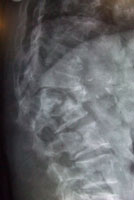
Top stories






More news


Marketing & Media
Ads are coming to AI. Does that really have to be such a bad thing?














"Known as the silent epidemic because it exhibits no symptoms, osteoporosis is a disease that affects the strength of bones making them more susceptible to breaks and fractures, particularly in the hip, spine and wrist areas. Healthy bones are continuously being renewed, with old bone being removed by cells known as osteoclasts and new bone being built by osteoblasts. In people with osteoporosis the timeworn bones are destroyed faster than they can be replaced, making them thinner and therefore more fragile," explains Tereza Hough of the National Osteoporosis Foundation of South Africa.
"Most fad diets exclude calcium rich foods such as milk, yoghurt and cheese, and herein lies the problem," says Hough. She adds, "With rising numbers of African women subscribing to eating plans designed to bring down the number on the scale, they are quite literally changing the properties and mass of their bones and as a result, increasing their chances of getting osteoporosis later on in life."
Although osteoporosis can be found in both men and women, it is more prevalent in post-menopausal females, and now this trend is extending to African women as a result of recent developments such as urbanisation. Genetic factors also have a key role to play in a person's risk of developing the disease and those with a history of the condition in their family should go for regular BMD tests to assess their bones' state of health. 2, 3
"The good news is that several steps can be taken to combat the onslaught of this disease. Weight watchers can include calcium rich foods that are not fattening on their daily menus such as nuts and seeds, including almonds and sesame, beans, oranges, figs, broccoli and green leafy vegetables like kale. Furthermore, weight bearing exercises are very good for building bone strength and are great for the figure too," says Hough.
"A definite increase is being seen in the incidence of osteoporosis in modern African women. In light of this fact, I highly recommend that all females include the recommended daily allowance of calcium in their diets of 1 000mg for adults under the age of 50, and 1 200mg for those who have passed the 50 mark. Vitamin D is also a vital component in the fight against osteoporosis and doctors advise that the optimal intake is between 1000 IU and 2000 IU per day," says osteoporosis specialist, Dr Stan Lipschitz.
Those in the know are concerned about the higher prevalence of osteoporosis in African women. Shouldn't you be concerned too? Speak to your doctor about being tested for osteoporosis and ask about the best treatment for your condition and lifestyle. Alternatively visit the National Osteoporosis Foundation of South Africa (NOFSA)'s website (www.osteoporosis.org.za) for more information and assistance. Don't let the silent epidemic get the best of you. Stand tall for your independence today.
1. National Institute of Arthritis and Musculoskeletal and Skin Diseases:
www.niams.nih.gov/Health_Info/Bone/Osteoporosis/Background/default.asp
2. Timeless Women; what is Osteoporosis: www.fortimelesswomen.com/osteoporosis-information/about-osteoporosis/what-is-osteoporosis/.
3. Osteoporosis in South Africa by Stephen Hough: www.mrc.ac.za/chronic/cdlchapter13.pdf (page 9)